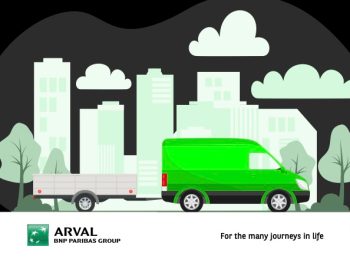Impact of load and towing on EVs revealed in new Arval research
Arval UK has published a new report investigating the impact of load and towing on EVs.

The research found eLCV range while towing reduced by between a quarter and a third over the real-use figure, depending on load
The leasing and fleet mobility specialist says it’s conducted scientific research that shows towing with an electric vehicle will reduce range by 23-31% against the real-world figure.
Uncovered in its new ‘Electric Vehicles Revealed’ report, the analysis showed a 23% fall in range for an electric car when towing.
But the report also provides up-to-date insight into the impact of payload on electric light commercial vehicles – both midsize and large – alongside the towing data.
For midsize eLCVs, a half load slashed the real-world range by 7%, rising to 11% with a full load. Add in towing and the range was 24% lower than the unladen real-world maximum. That’s around a 14% drop from fully loaded to fully loaded plus towing.
For large electric vans, the half-load figure recorded an 11% drop, for a full load 14% and when towing the range was 31% lower than the real-world maximum. Moving from full loaded to fully loaded plus towing equates to a 20% drop in range
By comparison, for diesel vans, Arval’s experts use a degradation in fuel efficiency of 15% when towing, against a van that’s at 100% payload.
Quantifying this further, Simon Cook, Arval UK’s LCV consultant and a contributor to the report, explained: “If your fully charged van range is typically 120 miles unladen, then you’re looking at an 83-91 mile maximum while towing. If you’re already operating on the basis of a range while at 100% payload and a range of 105 miles, then the impact of towing will be a 14–22-mile decrease.”
Details of the forthcoming ZEV mandate are still to be announced but the Government’s initial target for new electric vehicles sales set at 22% for cars and vans in 2024.
This means that fleet knowledge of which roles electric vans are suitable for is vital.
Cook added: “Electric vehicles are very good for the act of towing – their smooth and instant power delivery really helps. However, the range and charging infrastructure mean electric vans won’t work for all businesses’ needs at this point in time. Arval’s data empowers fleet managers and corporations to work out which jobs electric vans can do now. It also shows that when upcoming new longer-range electric vans are available, how these could be used by businesses.”
Arval added that progress on eLCV adoption was being made in a number of areas, including van ranges and charging infrastructure, but said there were still hurdles to address to enable take-up for higher-mileage use cases.
The report points out these fleets may need to look at their entire transport and logistics business model. Disruption in this area could provide a solution perhaps through more vehicles and more localised operations. However, the immediate impact of such a move is currently a significant increase in costs.
To download the research report, please click here.

